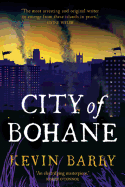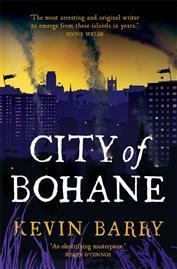
 Limerick-born Kevin Barry's first book, the short story collection There Are Little Kingdoms, won the Rooney Prize for Irish Literature. City of Bohane is his first novel and it's, well, different. Barry seems to relish splashing around in the literary mud puddles left behind by language-obsessed writers like Flann O'Brian, Cormac McCarthy and Irving Welsh. Meanwhile, an equally passionate love of film (think Quentin Tarantino and Sergio Leone) casts a flickering shadow over Barry's fictional world; pop culture crashes into language, and they are both dressed to the nines.
Limerick-born Kevin Barry's first book, the short story collection There Are Little Kingdoms, won the Rooney Prize for Irish Literature. City of Bohane is his first novel and it's, well, different. Barry seems to relish splashing around in the literary mud puddles left behind by language-obsessed writers like Flann O'Brian, Cormac McCarthy and Irving Welsh. Meanwhile, an equally passionate love of film (think Quentin Tarantino and Sergio Leone) casts a flickering shadow over Barry's fictional world; pop culture crashes into language, and they are both dressed to the nines.
It's 2053 in western Ireland. The Bohane river has a "taint of badness" in it, a "blackwater surge, malevolent." The city, "spawned by it," is run by the Fancy gang, led by Logan Hartnett--he of the hand-stitched Portuguese boots and a "mouth of teeth on him like a vandalised graveyard." Logan is accompanied by his wife, Macu (short for Immaculata), his ancient mother, Girly, and a crew of 17-year-old lieutenants with names like Wolfie Stanner, F***er Burke and Jenni Ching, the last a "saucy little ticket in her lowriders and wedge heels."
Then, into this "black forlorn... and violently windy" town, arrives Gant Broderick, a rival gang leader with hands the "size of Belfast sinks." Gant had a thing for Macu 25 years ago, and the stage seems set for a violent conflict of Shakespearean proportions. The book's four parts, set over 11 months, resemble dramatic acts: think Montague versus Capulet, or Scorsese's Bull the Butcher against Amsterdam Vallon.
Barry populates City of Bohane with language as strange and colorful as the characters. The Bohane accent is "flat and harsh through the consonants, sing-song and soupy on the vowels, betimes vaguely Caribbean," and the dialect is full of slang and swearing. There's talk like "my brud's gone loolah," to go along with the hoors, grog pits, needle alleys and dream salons--y'check me?
Readers can enter City of Bohane anywhere and enjoy the language and the descriptions without worrying about the story. There is a story, fierce and destructive, but it seems to be overwhelmed by the novel's awesome, even over-powering, use of language. If Kevin Barry can next join his words to a tale worth telling, watch out. --Tom Lavoie, former publisher
Shelf Talker: A dystopian polyglot novel full of language that reads like a perverted hybrid of A Clockwork Orange and Trainspotting.

